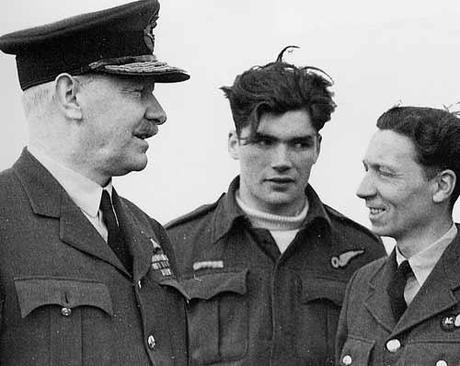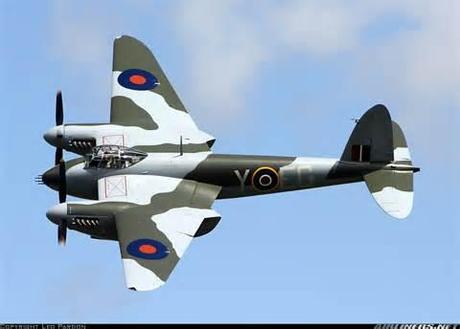This continues a conversation already begun in the comments thread to the previous post concerning the pros and cons of the late Air Marshal Sir Arthur 'Bomber' Harris, the man who almost single-handedly drove through the controversial (then and now!) mass, area-bombing campaign against Germany during the war.

I will begin by confessing that I haven't the time to research this 'opinion piece' and that it depends - God help it! - on my memory of the various history books I have consumed over the years. But, hell, this is a conversation not a history paper!
In my view there was only ever one justification for the area bombing of Germany and that was under the somewhat doubtful imperative of 'something must be done!' During 1941 to 3 only Russia was fully engaged in war with Germany and Churchill was always worried lest the Russians and Germans declared 'a score draw' and signed a separate peace. Equally, of course, Stalin would have been watching like a hawk for any signs that Britain might sign a peace with Hitler. At this time, the only means Britain had for waging an offensive against Germany and thus convincing Stalin that they were in it until the end was the aerial campaign in which 1,00-bomber raids became the norm. This was exactly what 'Bomber' Harris wanted and had pushed for.
Whatever the defenders of 'carpet' bombing might say, accuracy was never part of its concept, especially the night bombing which became the preserve of the RAF whilst the USAAF conducted the daylight raids. Claims that they were 'aiming' at railway junctions, factories and the like were simply a fig leaf to hide the lie! 'Bomber' Harris, to his credit never bothered to hide the truth:
the aim of the Combined Bomber Offensive...should be unambiguously stated [as] the destruction of German cities, the killing of German workers, and the disruption of civilised life throughout Germany.
... the destruction of houses, public utilities, transport and lives, the creation of a refugee problem on an unprecedented scale, and the breakdown of morale both at home and at the battle fronts by fear of extended and intensified bombing, are accepted and intended aims of our bombing policy. They are not by-products of attempts to hit factories.
Well, 'war is hell', as they always say - but usually too late! - and the use of maximum power against an enemy complies with the theories of Clausewitz, but only if that power is effective. Judging the power of Bomber Command's aerial bombing is controversial because there are innumerable quotes from different sources attesting to its effectiveness. For example, from a German source it was pointed out that thousands of deadly 88mm AA guns used to defend German cities could have been diverted to the Easter Front with devastating results against Russian tanks, But that is, so to speak, a tactical result not a strategic one. Harris's entire reasoning in support of his campaign was that mass bombing was a strategic weapon which would win the war, in fact, so devastating would it be that ground troops would simply be required to stroll in and police the ruins once the war was finished. The fact remains that, the final few months excepted, under the guidance of Albert Speer, German industrial output increased during the war!
Before Harris's concept is dismissed out of hand it is worth considering more deeply. Supposing that all the treasure spent on building up huge armies and conducting campaigns in North Africa, Sicily, Italy and finally the invasion of France had instead been spent on, say, quadrupling or more the size of Bomber Command. Could Germany have withstood such sustained destruction on such a scale, say, a Hamburg fire storm every other night? Well, if a bombing offensive really was a strategic war-winner then, in line with Clausewitz, we should have pursued it with real vigour, cutting back on everything else, and simply flattened Germany into submission. So it may be that Harris was right but never had sufficient wherewithal to see his plan executed properly. Whatever the merits or otherwise of that proposition, the fact is that even with the 'limited' resources Harris deployed there were increasingly loud voices, including Churchill's, being raised in opposition on humanitarian grounds.
However, what condemns Harris's policy is that there was an alternative bombing strategy available which not only would have avoided much of the civilian casualties but would have increased enormously the destruction of key industrial targets in Germany. It came in the form of an elegant but deadly aircraft - the de Havilland Mosquito:

Everyone remembers the Spitfire and the Lancaster but the Mosquito has faded from popular memory which is a pity because it was arguably the greatest aircraft designed by Britain in WWII. It was certainly the most adaptable being used as a fighter, a night-fighter, photo reconnaissance, sub-hunter and bomber. Its huge advantage over the lumbering Lancaster was that it was very fast and deadly accurate. On one raid it blew a hole in a prison and enabled the escape of some resistance fighters. In addition, and this was a huge difference ignored by the likes of Harris, if it was shot down the RAF lost a crew of two! If a Lancaster went down the loss was 7 or 8 personnel. As a percentage, human losses in Bomber Command were only exceeded by the German submarine service. If Lancaster production and use had been scaled right back and switched to Mosquitoes then swarms of these deadly aircraft could have over-run German defences and delivered their payloads right into the railways, factories, oil/coal installations, government facilities with pinpoint accuracy. And they were made of wood and canvas! The cheapest bargain bomber anyone could have. Even Göring was impressed:
In 1940 I could at least fly as far as Glasgow in most of my aircraft, but not now! It makes me furious when I see the Mosquito. I turn green and yellow with envy. The British, who can afford aluminum better than we can, knock together a beautiful wooden aircraft that every piano factory over there is building, and they give it a speed which they have now increased yet again. What do you make of that? There is nothing the British do not have. They have the geniuses and we have the nincompoops. After the war is over I'm going to buy a British radio set - then at least I'll own something that has always worked
So, alas, I must come to the conclusion that Harris was a bonehead, unable to think outside his self-induced bubble. It doesn't make him a bad man, just a stupid one. But then we're used to those serving in the highest positions of command over our armed services!
